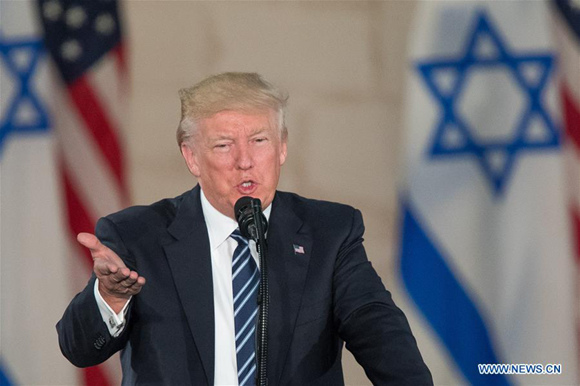
U.S. President Donald Trump delivers a speech at the Israel Museum in Jerusalem on May 23, 2017. In the final remarks that concluded his first visit to the region, U.S. President Donald Trump said Tuesday that peace between Israel and the Palestinians is "possible". (Xinhua file photo/JINI)
Despite global opposition and protests, U.S. President Donald Trump on Wednesday fulfilled one of his major campaign promises by recognizing Jerusalem as the capital city of Israel, and demanded the State Department to develop a plan to move the U.S. embassy from Tel Aviv to Jerusalem.
Experts argued that Trump's decision, a bold step that could change the status quo in a highly sensitive region, is likely to draw rage and revenge, and more importantly, dampen the peace prospect in the Middle East.
"RECOGNITION OF REALITY"
In a televised speech, Trump announced he is "determined that it is time to officially recognize Jerusalem as the capital of Israel."
"This is a long overdue step to advance the peace process and to work towards a lasting agreement," Trump said, arguing his announcement is just a "recognition of reality," and is "not intended in any way to reflect a departure" from the U.S. commitment to a lasting peace agreement "acceptable to both sides" in the Middle East.
"We are not taking a position of any final status issues, including the specific boundaries of the Israeli sovereignty in Jerusalem or the resolution of contested borders," he said. "Those questions are up to the parties involved."
Earlier, the Palestinian authorities have reiterated their stance that there will be no sovereign state of Palestine without East Jerusalem as its capital.
Speaking of the moving of the U.S. embassy, Trump said the State Department will immediately begin to hire architects and engineers, so as to make the new embassy "a magnificent tribute to peace" when completed.
He also announced that Vice President Mike Pence will travel to the region in the coming days to "reaffirm our commitment to work with partners throughout the Middle East to defeat radicalism."
POLITICALIZED MOTIVES
Analysts said that Trump took a hardline stand mostly because that appeals to the religious wing of his conservative base.
Daniel Serwer, director of Conflict Management at the Johns Hopkins University, told Xinhua that Trump's main motive seems to "be satisfying a domestic political constituency that wants the administration to be as pro-Israel as possible."
Secondly, Trump came into office with promises to stop terrorism, which means a closer relationship with Israel, since Israel is the U.S. only true ally in the Middle East, said analysts.
Moreover, the disruptive moves by the Trump administration may "reshuffle the deck" and somehow make the Israeli-Palestinian problem easier to solve.
"That isn't likely to be the case however," Serwer noted. "Any announcement changing existing U.S. policy without being even-handed will reduce the likelihood of an agreed peace."
"The U.S. has always been pro-Israel, but until now it has not necessarily been perceived as anti-Palestine. This will make it hard for many, including me, to believe that the administration supports a two-state solution, which many of us regard as the only outcome that will lead to stability," he added.
Dan Mahaffee, vice president and director of policy at the Center for the Study of Congress and the Presidency, also told Xinhua that Trump's decision to move the embassy reflects a willingness of his administration to "shake up the peace process" and the push to make a deal, "despite the offense to Arab nations and the risk of inciting further violence in the region."
BACKFIRING CONSEQUENCES
In the eyes of Darrell West, a senior fellow at think-tank Brookings Institution, Trump's decision to recognize Jerusalem will upset Palestinians because it unilaterally changes the status quo in favor of Israel without providing any benefits for them.
"There likely will be considerable unrest after that decision is publicly announced," he noted.
Serwer also said Trump's move "is not unexpected but is unwise."
"It is just as much a mistake now as it was months ago," he said. "If the Palestinians get nothing, it will be hard for them to return to the negotiating table. It may also cause widespread protests."
Shibley Telhami of the Brookings Institution was quoted by media as saying that "the move would go against the very priorities that the administration has set for itself in the Middle East: fighting Islamist militancy and confronting Iranian influence."
"Jerusalem is the perfect issue for Iran and Islamist militants to use to mobilize support against the United States and those who endorse its policies," he added.
When asked about the possible security risks of the U.S. citizens and agencies in consequence of Trump's decision, State Department spokeswoman Heather Nauert said in a Tuesday briefing that the agency has "put out information to not only our personnel but also the American public through some of our embassy websites."
"We take the situation seriously and we're closely watching it," she added.
Speaking of the possible benefits that the decision could bring to the United States, Serwer noted that Trump's announcement "will make the U.S. even more of an Israeli ally than it already is."
MESSY MIDDLE EAST POLICY
When asked to comment on the Trump administration's Middle East policy, Serwer said "the strategy seems to be yes to Israel, no to Iran, and kill the Islamic State."
Or maybe Trump is serious about engaging in achieving the lasting peace in the Middle East. However, in the eyes of Ilan Goldenberg at the Center for a New American Security, "if you're about to launch a major peace plan, the last thing you want to do is to take this highly sensitive question of Jerusalem and just throw it into the mix."


















































